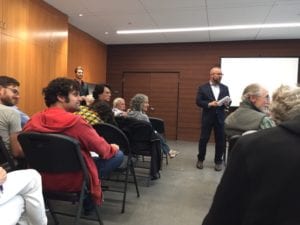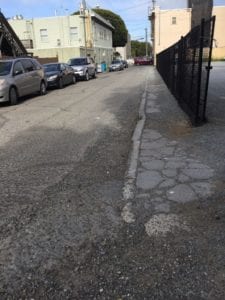
There seemed to be a lot of new faces at the meeting at the Rec Center on July 25. Maybe they wanted to hear and speak to Supervisor Mandelman, or find out the latest in the Kern alley saga, or broaden their vision of the future with the presentation on autonomous vehicles in San Francisco, or all of the above.
Supervisor Mandelman:
The supervisor introduced Jessica Closson, who will be District 8’s public liaison with the SFPD. She’ll be working on property crime and safety, encampments and other homeless issues. Email her at jessica.closson@sfgov.org.
SB-1045 will finally be implemented in San Francisco. It’s a pilot program that modestly expands public conservatorship as a tool to help the mentally ill and drug-addicted get the treatment they need, when other means have failed. Currently San Francisco has one-quarter the rate of public conservatorships than other counties because of the lack of necessary placement options.
With Mayor Breed, Mandelman is co-chair of the Crystal Methamphetamine Task Force. They will have recommendations in September and move toward implementation of long-needed programs such as treatment on demand. It’s difficult to have successful treatment because now 44% of addicts are released to shelters or the streets.
The supervisor is on the budget committee. The city has a budget of $12.4 billion. In a victory for the environment, and thanks to public outcry, $3 million has been allocated for tree planting, both to increase the canopy and to replace failing trees that were removed.
In District 8, $32K is budgeted for Greenway trail improvements, $40K for a College Hill improvement project (possibly a mural on one of the nearby bridges), $140K for play structures and fencing at Christopher Playground, and $90K for sidewalk gardens.
There are more no-fault evictions and displacements in the city because of rising property values. Forty-two thousand dollars will go to the District 8 housing affordability plan. D8 doesn’t get a lot of funding because there’s a lack of available land to build affordable housing. Other alternatives will be explored, such as converting other types of real estate into housing.
The Transit Performance Working Group will be having its first meeting about big problems. Trains are unreliable: “I hear about it all the time,” says Mandelman. Major projects, such as the Van Ness corridor and the Central Subway, are behind and over budget.
In the Q and A, Supervisor Mandelman fielded a number of concerns: Someone should assess trees in danger of falling, a neighbor suggested. Locally a tree fell on four properties. The city is on top of the problem on public property. His office will follow up with Friends of the Urban Forest.
On break-ins in the village: Mandelman said the police budget is getting a $60 million increase, including more overtime, $1 million more for foot patrols, and investing in more police academy classes, although classes of 50 have declined to around 30.
Neighbors at Chenery and Miguel are fed up with the lack of progress in the sticky 35-bus route situation. Only a bad patch has been done on the street. SFMTA communication is poor. The route needs to change, said Mandelman.
The perennial bike rack location issue was discussed – how many, size, where, program oversight, Lyft lawsuit, etc.
How will the PG&E bankruptcy affect taxpayers and homeowners? The city government is united in wanting to form a municipal utility, but the governor is against it. The supervisor said such a move would figure into the rates but might not cost more.
Kern Alley:

Tom Folkes of SFMTA and John Thomas of SFPW were there to get feedback from the community on improvements needed and pedestrian and vehicular safety.
A big complaint is the condition of the sidewalks. The south side is a crackled mess. The north is crowded with trash bins from the nearby businesses; they have different rules from residences on obstructing sidewalks.
This is where we learned a relevant new term: unaccepted street. It’s a street that is not maintained by the city as it doesn’t conform to the standards for a city street. In the case of Kern, for example, the sidewalks are narrower than the four-foot wide requirement.
Public funds cannot be spent on maintaining unaccepted streets. The city can inspect and notify adjacent property owners about problems and relies on their cooperation. The city will, however, remediate outright unsafe conditions.
If the property owners apply for a permit to make improvements, they must then meet applicable city standards.
Though not unique to San Francisco, our city seems to have more than its fair share of unaccepted streets.
There was discussion about making Kern a one-way street, exiting on Brompton Avenue. This would require a petition from nearby property owners, for a start.
For a recent article about unaccepted streets in San Francisco, go to:
https://www.sfchronicle.com/bayarea/heatherknight/article/SF-property-owners-maintain-streets-that-city-13991425.php
Autonomous Vehicles:
Federal, state and local regulations govern the standards for testing, safety, and enforcement of traffic regulations, including for autonomous vehicles (AVs).
AVs will have a profound impact on cities. They have the potential to transform land use, curb space, traffic lanes, modes of transit, public rights of way and how we move about generally.
While the city grapples with traffic gridlock and pedestrian safety issues, it is also preparing for the day when AVs will be the norm on San Francisco streets.
Mike Tan, project manager in the SF County Transportation Authority, and a consultant, Samantha Soules, described a three-month automated shuttle pilot study under the Treasure Island Mobility Management Agency (TIMMA).
The study will evaluate the safety, reliability and accessibility of AV shuttles, and their long-term cost and feasibility within Treasure Island.
The shuttle will provide intra-island transport and connect different modes of travel, e.g., buses, bikes and ferries. An operator –“concierge” – will be on board the shuttle for safety and assistance.
The project will be in planning and shuttle procurement stages through late-2020. Testing and evaluation will happen in 2021.
Meanwhile on mainland San Francisco, an AV program will be rolled out by Cruise, a GM subsidiary.
Mason Smith and Eric Young of the SF County Transportation Authority said Chevy Bolts will be used in mapping and testing. The vehicle can convert from autonomous to manual operation. In AV mode the operator will have hands on the wheel and the operator and a passenger will be taking notes.
Cruise will be deployed as a ride share service. The rider will summon the vehicle from its charger to its destination.
They anticipate safety will improve with AVs, as there are 100 deaths per day in motor vehicle accidents, mostly due to human error. Accessibility and mobility will be enhanced. The environment will be better off as well with zero emission vehicles.
No schedule has been set for roll-out of the program, and no number of vehicles has been determined. Those features will be dictated by safety considerations. It won’t be this year.
A recent article in the SF Chronicle detailed the complications and pitfalls in adopting AVs:
https://www.sfgate.com/business/article/Despite-high-hopes-self-driving-cars-are-way-14110041.php